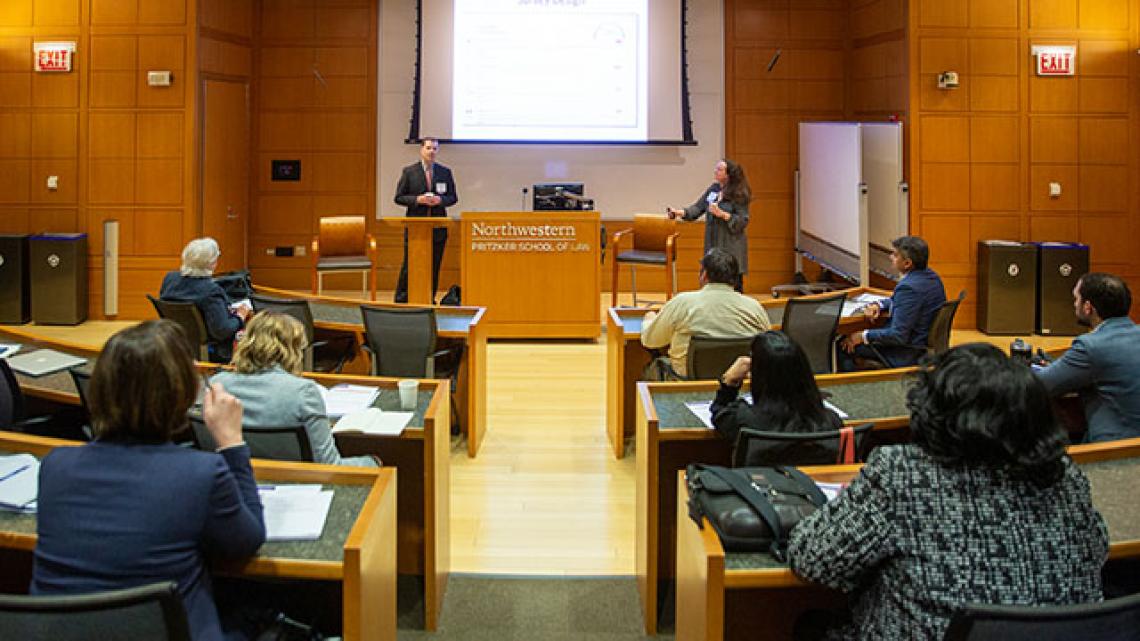May 24, 2019 | By Storer Rowley
Northwestern University hosted its 12th annual Best Practices Forum this week, showcasing innovative programs, collaborations and achievements that have been implemented on Northwestern campuses across the globe.
Sponsored by the Office of Organizational Strategy and Change, with support from Provost Jonathan Holloway and Senior Vice President for Business and Finance Craig Johnson, this year’s forum was held May 21 at the Northwestern Pritzker School of Law on the Chicago Campus.
Interdisciplinarity requires collaboration
“A great university can unleash the intellectual talent that can go forth and make the world better. That’s a good community to be part of,” said Holloway in opening remarks that kicked off the forum, attended by nearly 200 people. “This is why the Best Practices Forum is so important.
“It’s an opportunity for disparate parts of the university to come together and learn how great things are accomplished,” he added.“We are excellent, and you are doing the work to make us excellent.”
Throughout his remarks, Holloway highlighted the aspects of Northwestern that make it distinctive, emphasizing that “we are truly an interdisciplinary university.” That positions Northwestern well to thrive, Holloway said, and it is “the key to finding the answers to the vexing problems of the future.”
Interdisciplinarity requires collaboration, and that is what the Best Practices Forum is all about, he said. He spoke about his collaboration with Johnson, and thanked all the staff who collaborate daily.
Space for learning
The forum is a unique event that creates space for learning, community and connection; acknowledges and thanks the staff for their work; and provides them with greater linkages to leaders and the University’s priorities, values and goals.
Staff sessions and panels this year included walking tours of the soon-to-be-opened Simpson Querrey Biomedical Research Center at Northwestern Feinberg School of Medicine and “At Home Abroad,” a recap of the global lessons learned during the first decade of operations at Northwestern University in Qatar. NU-Q Dean and CEO Everette E. Dennis was on hand to moderate the “At Home Abroad” panel discussion.
Other sessions focused on a range of topics from “Using Qualtrics: Your Enterprise Survey Tool” to “Run, Hide, Fight: A Model for Change.” The safety video, explaining the “Run, Hide, Fight” protocol for members of Northwestern’s community to follow during an active aggressor scenario, was a collaboration between the Department of Safety and Security, the Office of Global Marketing and Communications and other University units. The cross-unit team gave a panel presentation that showcased how to lead change through close cooperation and communication among experts across departments.
There were additional presentations on “Students at the Statehouse: Truman Nominees Meet Springfield” and “Reliable Academic Unit Data At Your Fingertips.” One session focused on “Tools to Change How We Work Together” and another on how “Collaboration Yields Inspiration,” a successful collaboration between the School of Education and Social Policy (SESP) and the Office of Global Marketing and Communications(OGMC).
The collaboration presentation brought together SESP Dean David Figlio and Andy Madorsky, assistant vice president for OGMC, in a conversation about close work between the school and the department to tell the SESP story about a marketing and communications platform comprised of many elements, including web, video, print and social media. Figlio repeatedly returned to the theme of sharing expertise while simultaneously recognizing the expertise of others.
Organizational change leadership
Kimberly Yuracko, dean of the Northwestern Pritzker School of Law, delivered a powerful and moving keynote address entitled "The Science and Psychology of Organizational Change Leadership," in which she outlined the collaborations involved and the difficult choices she had to make to bring the Law School onto a firmer financial footing.
“I learned two key things about leading organizational change,” she said. “First, change is both necessary and inevitable, and second, successful change is collective work and is informed by the wisdom and guidance of our community — staff, faculty, students and alumni.”
“In short, our change was successful because of our people,” she added. To achieve such change, Yuracko observed, community members “must believe it is necessary, that it comes in response to real problems and not a hidden agenda, and that after the change things will get better.”
In the closing session of the Best Practices Forum, Heather Campbell, vice dean for finance and administration at the Feinberg School, explained another kind of transformational change at the medical school. She said the school has moved steadily upward in a variety of rankings in recent years, most notably from 39th to 15th in the amount of research funding it receives annually from the National Institutes of Health.
“We’re the fastest growing medical school in the country,” she said, noting the success is built on learning from enormous changes in finance, administration, infrastructure, curriculum, clinical care and educational mission. She also credited the “strong vision” of Feinberg Dean Eric Neilson, who focused on “how we take this place from what is already great to even better.”
This year, the Best Practices Forum’s program was also available in digital form on Sched that allowed attendees to download the guide to view the day’s agenda and review concurrent session information.
Review the day of events at the forum, including sessions facilitated by staff across numerous schools and units.

